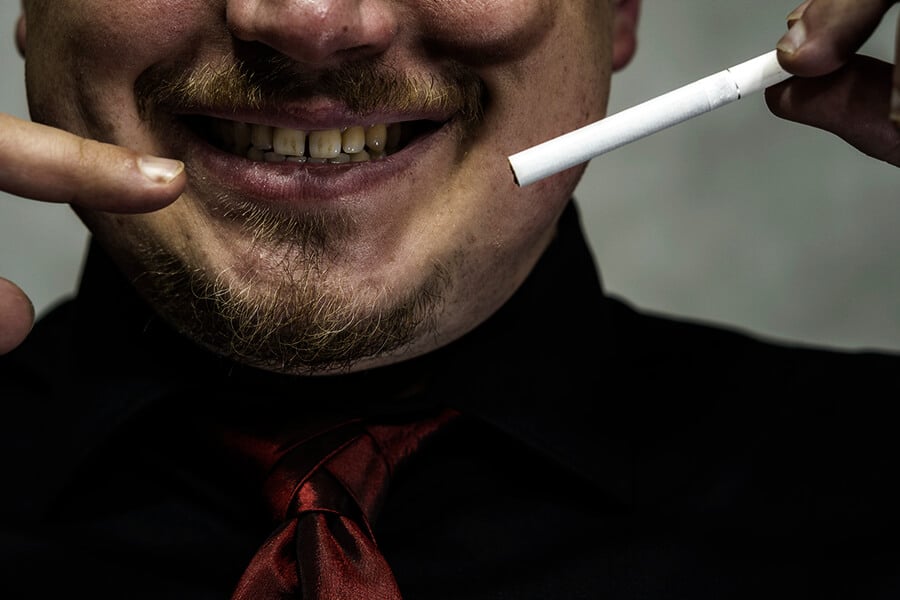Smoking is bad for your teeth and your dental health. Let’s be honest, you probably already knew that, but you may not have ever asked specifically how smoking affects your teeth. The American Dental Association has identified the major ways your dental health is undermined by tobacco products including cigarettes, cigars, pipes, and chewing tobacco products. Smoking stains your teeth and dulls your sense of taste and smell. It slows and sometimes impedes healing after oral surgery and tooth extractions. And worst of all, it causes gum disease and oral cancer.
Stained Teeth
The first way smoking undermines your dental health is by staining your teeth. Besides coffee and tea, tobacco is probably the number one reason people have dark stains on their teeth. This is because the tar in the cigarettes stays on the teeth long after the cigarette is gone, and the longer it is there, the more the dark pigment particles will soak through the enamel and add yellowish-brown stains to the dentin layer.
Think of it this way. We normally eat about three to four times a day. If we are very conscientious about our dental hygiene, we will brush and floss thoroughly after every meal. More often, people just brush and floss once or twice a day. That keeps the dark pigment from coffee, tea, and highly colored foods from soaking through our enamel and causing discoloration. But smokers sometimes light up twenty or more times in a day. Can you imagine brushing and flossing twenty times a day? Most people can’t, so all the tar from all those cigarettes ends up staying on the teeth much longer.
Dulled Sense of Taste and Smell
The second detriment caused by smoking is dulled senses of taste and smell. Smokers don’t experience the same vivid smells that non-smokers do. And because the smell is a large part of our sense of taste, flavors are dulled as well. While it’s easy to imagine not being able to smell the aroma of fresh-brewed coffee or baked goods, it’s harder for smokers to imagine what they might be missing on a beautiful spring day when the lilacs and apple trees are blooming.
Don’t think of this as just an aesthetic impairment, it may be the reason that many smokers overeat. If you can fully enjoy all the nuances of a meal, it’s easier to be satisfied with just enough.
Slowed or Impeded Healing
The third way smoking affects your teeth introduces more serious harm by impeding your health. Most people have to get a wisdom tooth removed or have some other oral surgery procedure during their lives. If you’ve ever been warned not to smoke after a tooth extraction, you know dry sockets are one of the risks you run if you do continue to smoke. This is a very painful condition that is caused by the sucking action smokers engage to bring smoke into their mouths. When a tooth is extracted, it leaves a hole in the bone where nerves may be exposed. A blood clot normally forms to protect the area of the extraction. But when the clot is dislodged, and nerve endings are exposed to cold air, this causes extra pain.
The slowing of other healing processes can have a much greater effect than the just dry socket. When it comes to dental implants, as with joint replacement surgeries like knee and hip replacements, chances of failure of the implants is as high as fifty percent in smokers. So many dentists will recommend that you quit smoking before they will even proceed with dental implants.
Gum Disease and Oral Cancer
By far, the worst problems caused by smoking are increased risks of gum disease and oral cancer. Gum disease is often taken for a fairly moderate problem. For example, gingivitis, which is just the inflammation of the soft tissues that surround the teeth, can be resolved fairly easily with proper care and prevention. True gum disease, however, which is called periodontitis, cannot ever be cured. Once the inflammation has begun to undermine the bone structure that supports the teeth, it usually requires scaling and root planning, a periodontal treatment that cleans out pockets of decay and bacteria that lie under the gums. After this procedure, patients usually have to return for specialized periodontal cleanings about four times a year.
And finally, oral cancer risks are much greater among smokers than they are among non-smokers. According to the Oral Cancer Foundation, 75 to 90 percent of oral cancers are causally connected to smoking. Male smokers are 27 times more likely to develop oral cancer than males who never smoked and female smokers about six times more likely to develop oral cancer. You can read more at https://oralcancerfoundation.org/understanding/risk-factors/.
The good news is that within three to five years of quitting smoking, oral cancer risks drop by as much as 50 percent!
In Conclusion
Quitting smoking is not an easy task, but the rewards far outweigh the hard work. With more and more people studying how smoking affects your teeth, the reasons to quit keep adding up. If you want to quit smoking, there are more programs and methods available now than ever before. Talk to your dentist and do a little research. You are bound to find a method that will work for you as soon as you’re ready to commit to quit.

